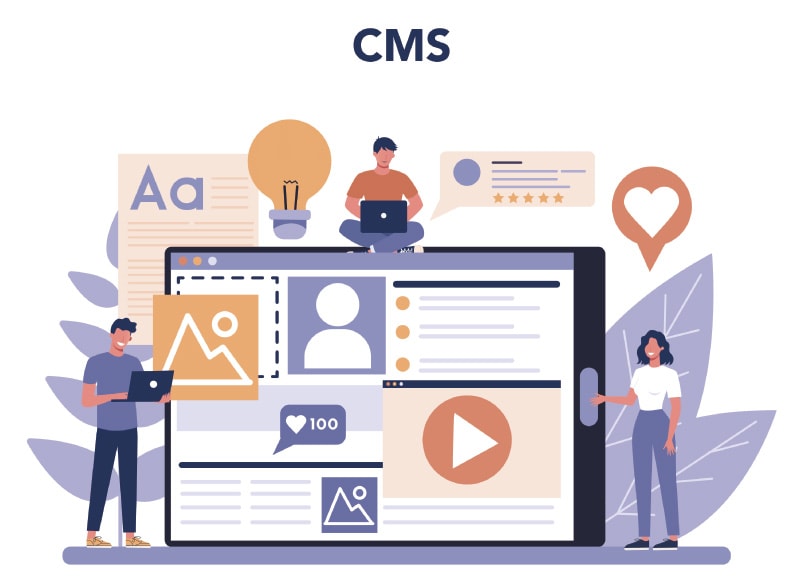How to Choose the Right CMS for Your B2B Website

We live in a fast-paced, plugged-in, always-on kind of world. If a B2B company wants to survive this year and thrive in years to come, differentiation is imperative. The best way to do that is by having a consistent digital presence and a strong website that delivers the right first impression.
When it comes to strong websites, their foundation is always the same: a high quality content management system (CMS).
Choosing the right platform for your business website can be tricky; in this article we’re going to provide insight into the most popular CMS systems businesses are using today, what factors come into play when choosing a CMS, and next step recommendations for B2B business owners.
Which content management systems are the most popular and why?
At a high level, you can divide content management systems into two main categories: hosted and self-hosted. Hosted platforms are going to be faster and easier because you won’t have to worry about the minute details. Self-posted platforms are going to give you more flexibility and accessibility, but also more responsibility.
Examples of some very popular hosted platforms include Squarespace, Shopify, and Wix. These are sometimes referred to as “all-in-one-platforms” since they’re built from templates and hosted on their own servers. For those that aren’t as tech savvy, these offer a simple and straightforward way to quickly build a website for individual business owners or start-ups. The downside of hosted platforms is that you will always be beholden to the host, which may put you in a situation down the road where you don’t have the flexibility you want.
On the other side, there are a huge number of self-hosted platforms to choose from. Some very popular, open-source (free to use) CMS’s include WordPress, Concrete5, and Drupal. All of these platforms are widely used and have large communities supporting them, but WordPress is by far the most popular platform (it’s estimated that almost 40% of websites are built with WordPress). A self-hosted CMS comes with a lot of benefits: unique domain names, better SEO editing opportunities, plug-ins, built-in customer support, as well as many other customization options.
You know your business better than anyone else, and that includes what type of CMS best fits your needs. Before you make any decisions, however, there are still more things that need to be considered first.
For instance, just because WordPress is the most ubiquitous platform, that doesn’t always mean it’s the right one for you. Consider the following factors first before making your final decision.
What things should I consider when choosing a content management system?
If you’ve read this far, you’re already familiar with the differences (including pros and cons) of a hosted versus a self-hosted CMS. There are a few other factors that go into choosing the right content platform, however, and those include:
- Cost and maintenance. The cost of a website is a significant factor when considering which CMS to pick. Even though open-source generally means the use of the platform is “free”, there are associated costs that will vary depending on your unique business needs. For established B2B businesses looking to take their company to the next level, many will seek assistance from agencies that specialize in certain CMS platforms. Most content management systems these days offer basic pre-designed templates. Squarespace, for example, is cheap and completely template based, only allowing for some customization in design. This is great if you don’t want to be overwhelmed by options. WordPress, on the other hand, costs slightly more, but has a gigantic library of templates to choose from and allows them to be customized to meet every single one of your needs. The amount of money you spend will depend on the level of customization you require.
- Your immediate website goals. What are your company’s most important goals? For most B2B businesses the list sounds something like this: drive qualified traffic to your website > turn that traffic into more qualified leads > grow your business. In order to drive traffic to your site, you’ll want to choose a CMS that works well with Search Engine Optimization (SEO) efforts. The heavy lifting of SEO work is done through custom design, content strategy, and development. Two of the most popular tools currently available for SEO are Yoast and Rankmath, both of which are WordPress site plugins. They’re both open source SEO plug-ins that make adding optimized meta descriptions, title tags, and other SEO markers to posts and pages easy. There are also a myriad of additional marketing tools that many B2B companies are already using. Hubspot, Salesforce, and Zendesk are all examples of super popular CRMs (customer relationship management systems), which are tools that help drive traffic and nurture leads.
- Future business growth. As your business grows, you want a website that can grow with it. Adding new products or services? Thinking about e-commerce or ERP integrations in the future? You shouldn’t need to overhaul your website to accommodate a new process or an influx of business. You’re going to want a content management system that offers access to wide libraries of plugins, extensions, and supporting documentation, as well as the ability to customize new features. That way, as your business expands or changes, you’re already connected to the tools to facilitate that growth.
Which content management system does Windmill Strategy recommend?
While we think it’s important to be impartial when it comes to analyzing your options, we still have a favorite CRM for most B2B marketing websites: WordPress. While we do some work with Concrete5, and Drupal is a good tool for organizations like Universities and the like, WordPress is usually the go-to for B2B and industrial marketing websites. There are a lot of reasons why we prefer WordPress.
Here’s the first one: it’s never, not even once, let us down (no matter what wacky strategy or design idea we threw at it). Here are a few others:
- Integrations are easy. The list of available integrations for WordPress feels endless. Name a feature you want on your website and you can most likely have it. This includes e-commerce, video, and virtual events, which have exploded with prevalence during the pandemic and subsequent time spent in quarantine in 2020. A lot of B2B companies traditionally rely on in-person industry focused trade shows. Many of these have been and are continuing to expand online. That’s why easy video integration makes WordPress a standout. It integrates with Zoom, and has many different options for creating webinars and virtual meeting spaces to connect with your customers. Not only that, but WordPress also integrates with giants like Youtube and Vimeo, offering plugins that allow you to manage your own video content seamlessly on your website.
- SEO. Some CMS systems can be too restrictive when it comes to SEO. WordPress allows you to modify the side code and customize MetaData, H1 tags and image ALT tags. In our experience, WordPress has been the most versatile and customizable CMS for SEO. Plus, if you remember what we said above, there are some great SEO plug-ins like Yoast and Rankmath available for use with the WordPress platform, making developing SEO strategy even easier.
- Portability. Because WordPress is non-proprietary and open-source, you have the freedom to take it with you wherever you want. That could mean switching hosting services if you want a bump in site performance, or it could mean switching designers, developers, or agencies to assist you with it as your business develops. You do not need to rely on one company or person to keep your site up to date and working for your business, and you’ll have no problem finding a talented WordPress developer. This ultimate flexibility means ultimately getting what you want, no matter what.
- Security. When the software and server are well-managed and kept up-to-date, and well-vetted plugins are enabled, we’ve found WordPress to be an extremely secure platform for our clients, so much that we offer a no-hack guarantee. With the world’s largest development pool, you benefit from daily crowdsourced security testing when you’re on this platform.
In the end, choosing the right content management system for your B2B website comes down to knowing your current needs, your growth goals, your limitations, and your budget.


